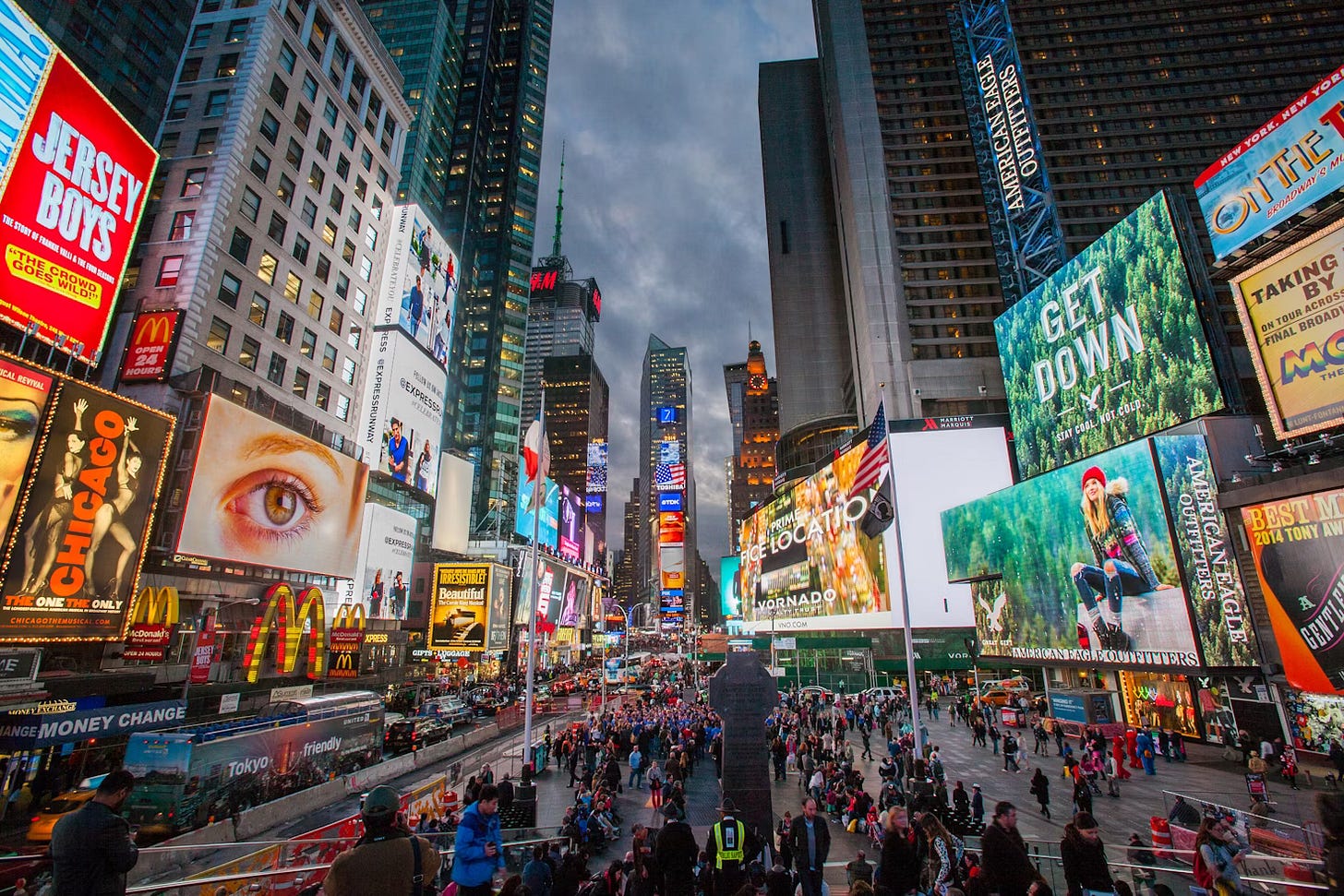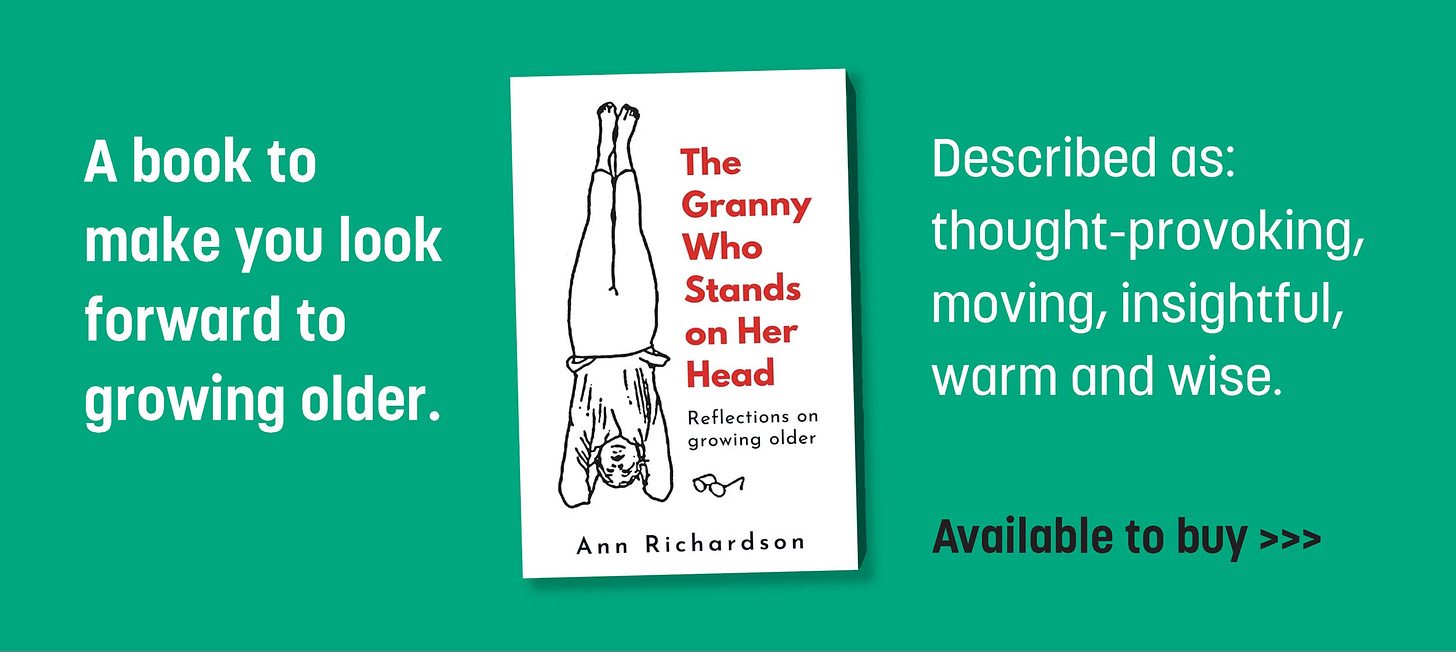Are you lured by fame?
No, I’m not either. But there was just one moment.
On an early evening in 1951, not long after we moved to Manhattan from Washington D.C., my father took me down to Times Square. There was a somewhat edgy feel, with a lot of flashing lights and bright billboards, including the famous ‘smoking’ one for Camel cigarettes which I remember still. He put one hand in mine and pointed the other dramatically upward, “Ann, one day your name will be up here in lights.”
It was a great moment. I thought gosh, yes, yes, could it be? I would then be famous and very successful!
But even at the age of nine, I wasn’t sure I believed him. I was always one for practicalities and I somehow knew that my name Ann Goldschmidt – whatever my talents proved to be – did not trip off the tongue. That name and that location just didn’t go together. I hadn’t heard of stage names then.
Never mind the fact that I had no idea what I wanted to do in life.
(I solved the name problem by marrying a Richardson at age 21 and, it must be agreed that Ann Richardson is much more mellifluous. I have been known to claim that I married my husband for his name, although that has little to do with our sixty plus years together.)
Knowing famous people
My parents, who both worked in professional jobs even when their children were young, loved the idea of becoming famous. They didn’t – not surprisingly, as my father was a civil servant and my mother was a lobbyist for social causes and a ‘policy wonk’ long before that term had been coined. (Thanks to my brother Art for pointing this out.) These professions will always be for the backroom and not for anyone seeking fame.
If they couldn’t be famous themselves, they could gain some of the glamour by knowing famous people. They managed to become acquainted with – and then friends with – a fair number of famous people by one means or another. Names were dropped and stories told whenever appropriate and sometimes when not.
Probably the most famous was Lyndon Johnson (LBJ) well before he became President. Being fellow Texans in Washington and of a similar vintage, my father got to know him in the 1930s and they had various dealings over the years (he features briefly and somewhat unfavourably in the famous Caro biography1). When LBJ suddenly became President in November 1963, both my parents were involved in informal planning discussions and my father was subsequently appointed to be an Ambassador. I’m not sure he liked the job, but he really loved the title.
When he died, my father was working on a memoir to be called “LBJ and Me”. He said this was intended a joke on himself. But anyone could see that it was one that nicely raised his game in readers’ eyes. The unpublished chapters were transferred to – and remain on – my computer and have been used by various historians over the years.
(Yet fame eluded him. I sometimes think that my father will end up having most – but not much – fame for something he would never have foreseen. He is the protagonist of my most read post: When Do People Stop Having Sex.)
My parents were also willing to claim a connection with famous people on very tenuous grounds. When James Callaghan became Prime Minister in 1976, my mother immediately told us with great pleasure that she knew him. That was a surprise, given that they were American through and through, and my English husband asked how this had transpired. It turned out that they were guests at a very large dinner where Callaghan was also a guest. Well, not quite.
And my mother missed a real catch. When I was two and we were living in peaceful Georgetown in Washington, the mother of another two-year-old lived three doors away. On a hot summer day, I am told, they met in her garden and chatted while we toddlers played in a paddling pool. This woman’s name was Betsy Blair and she explained that her husband, Gene Kelly, was away working on a movie. “What does he do? Is he a cameraman?” my mother politely inquired. Oh dear.
(Much later, I was told that at celebrations over the end of World War II, Gene Kelly picked me up and danced down the street with me in his arms. I loved that story until I wondered why it wasn’t his own daughter he danced with. My mother had an easy ability to stretch the truth, but perhaps he danced with both of us. How many living women can claim that they once danced with Gene Kelly?)
Fame never attained
Perhaps to my parents’ disappointment, none of their three children ever achieved much fame. Little awards here and there, but nothing to get very excited about.
Fame was never part of my calculations. Not for all the good reasons why being famous isn’t a great way to live, but simply because my interests lay elsewhere.
I never pursued any occupation likely to lead in such a direction. Rather by accident, I became – and then discovered that I loved being – a qualitative social researcher (this means I carried out personal interviews and focus groups, rather than analysing statistics). This is a very unglamourous activity at the best of times, even when subsequent reports and books had my name on it.
I also became a scribe for various groups wanting their thoughts kept for posterity, whether substantial Committees of Inquiry or, less grandly, assorted conferences. Again, not a job for anyone seeking fame. You rarely even get your name on the report.
But my image of ‘success’ – perhaps first fanned on that autumn evening in Times Square – never again incorporated fame as something to aim for. I found that I loved the thoughtful life, the private life of my family and a life of constant learning. And to spend your life doing what you love, to me, is one form of success.
It remains my life at 83. What a privilege.
Yes, yes, you all know that I love hearing from you. The ‘likes’ are definitely nice, but the odd sentence or paragraph is a real treat. How do you feel about fame? What did this post make you feel? You are all much too clever to need questions to answer – I like to think that I stimulated some thoughts of whatever kind and then am greedy to hear them.
And, as I note only now and then, if anyone is feeling in the mood to upgrade to a paid subscription, I will be hugely grateful – as will some homeless people in London to whom every penny is given.
Robert Caro, The Years of Lyndon Johnson, planned as five volumes of which four have been published to great acclaim. They present a brilliant sweep of a section of American history, as readable as any novel.





How I love the Gene Kelly story—and where you landed happily in spite of your father’s prediction of fame.
Your post made me think of a commencement speech you can find on YouTube titled "What Happens in the 16th Second?" In his speech, the orator details the sacrifices made to reach his goal of being the best and how long that exhilaration lasted.